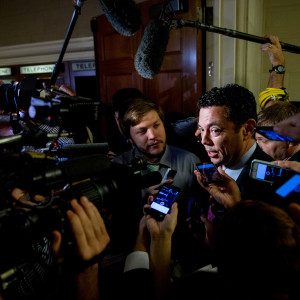Silicon Valley lost a potentially powerful, tech-savvy speaker last week when California representative and Majority Leader Kevin McCarthy withdrew from the race to lead the House, but the vacuum he left could soon be filled by a number of candidates who regularly court the tech sector on issues ranging from cybersecurity to surveillance and the growing digital economy.
McCarthy, a stalwart advocate of the innovation economy with a reputation for understanding startups’ policy needs, had Silicon Valley’s endorsement before he even decided to run. Though the tech industry was disappointed with his withdrawal, California Rep. Darrell Issa and Utah Rep. Jason Chaffetz, both of whom have championed the valley’s interests in the past, have already expressed interest in replacing outgoing Speaker John Boehner at the end of October.
As chairman of the House Oversight Committee, Chaffetz has called on government agencies to adopt strong encryption in the wake of the Office of Personnel Management hack — something the FBI and Chaffetz’s surveillance hawkish counterparts have blasted companies like Apple and Google for adopting by default for users’ communications over concerns of masking the communications of criminals and terrorists.
RELATED: Chaffetz on OPM Hack: ‘You Failed Utterly and Totally’
Issa, who previously occupied Chaffetz’s chair and sits on the House Judiciary Subcommittee on Courts, Intellectual Property, and the Internet, is a regular speaker at events hosted by companies like Microsoft, meets with the heads of startup successes like Nest and has advocated a deregulatory approach to the Internet of Things and on-demand economy made up of companies including Uber and Airbnb.
RELATED: Issa: Government Can Help the Internet of Things by Staying Out of It
Both voted in favor of the USA Freedom Act National Security Agency reform bill, amending Section 215 of the Patriot Act and dismantling the NSA’s bulk telephone metadata database — the program charged with collecting virtually all of Americans’ landline telephone records.
RELATED: Senate Passes USA Freedom Act NSA Reform Bill
The two also support the Email Privacy Act, which aims to close a loophole in the 30-year-old Electronic Communications Privacy Act that allows the government to subpoena emails from Internet service providers after they’re 180-days old.
Issa voted against the Protecting Cyber Networks Act, a companion bill to the Cybersecurity Information Sharing Act dividing the Senate, that would allow tech companies like Facebook and Twitter and share “cyber threat indicators” with the government — something digital privacy advocates oppose, and tech companies generally support. Chaffetz voted with the majority to pass the bill.
RELATED: Senators, Companies and Privacy Groups Use Experian Hack to Debate CISA
Issa has vocally called for further reforms to mass NSA surveillance authorities like FISA Amendments Act Section 702, which allows the agency to legally intercept the content of web communications by tapping the physical infrastructure of the Internet, such as undersea fiber cables, as they transmit between borders.
Chaffetz voted against an amendment specifically designed to limit the surveillance of U.S. citizens under Section 702, which Silicon Valley’s biggest companies have blamed for eroding trust in American firms overseas as a result of NSA programs revealed by Edward Snowden since 2013.
Cahffetz and Issa have both said they would step aside if Wisconsin Republican Rep. Paul Ryan changes his mind and decides to run, but they’re not the only ones eyeing the speakership that have tackled tech issues. Georgia Republican Lynn Westmoreland and Michigan Republican Candice Miller, two other names floated as “considering” in the last week, can also count votes for the USA Freedom Act in their favor.
Both voted in favor of the Protecting Cyber Networks Act and another House cyber threat data-sharing bill, and Westmoreland, who sits on the House Permanent Select Committee on Intelligence overseeing the NSA and cybersecurity, has been vocal in recent hearings with top intelligence officials on the need for a cyber aggression deterrence and retaliation policy in response to hacks like the one against OPM by China.
Miller, who sits on the House Homeland Security Committee, has led efforts to improve the cybersecurity in the lower chamber itself, and, as chairman of the Subcommittee on Border and Maritime Security, held a hearing earlier this month on improving the cybersecurity of the nation’s ports. Miller plans to retire in 2016, and would only serve as an interim speaker.

